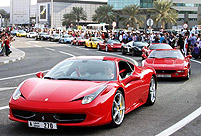PD Online: China is currently the second largest source of foreign investment in the Netherlands and its largest trading partner outside the EU. Economic and trade cooperation between China and the Netherlands has achieved a great deal. What are the secrets of successful Sino-Dutch trade and economic cooperation? How do you see trade and economic cooperation between China and the Netherlands shaping in the future?
Rutte: Our trade and investment relations are excellent, that’s certainly true. The volume of bilateral trade grew from a little over €1 billion in 1992 to €40 billion in 2012. Dutch and Chinese companies are comfortable doing business with each other, and both governments do a lot to stimulate our economic relations. There are many opportunities for further growth. Both our countries have, for example, a strong desire to make our economic growth greener and more sustainable. The quality of growth now matters more and more. Dutch companies and institutions offer innovative solutions in fields like energy efficiency, renewable energy, food security, health care and urban planning. There is already a great deal of cooperation in these areas. But also in other fields like water management, logistics, agriculture and high tech industries, our economic cooperation is expanding.
PD Online: What is the Netherlands’ stance on the high-profile dispute over solar panels between China and the EU? What is the impact of Chinese solar products on Dutch companies? The Netherlands is one of key members of the EU. In your opinion, what can China and the EU do to reduce trade friction and improve the level of mutual understanding?
Rutte: Within the European Union, the European Commission has the lead role when it comes to issues of international trade and investment. In the event of a trade dispute, it follows its procedures, in compliance with EU law and WTO obligations. Of course by far the preferred option is to find a joint negotiated solution, in order to avoid measures that might restrict trade. So I’m delighted with the successful outcome of negotiations between the European Commission and China on the solar panel issue. I am confident it will be adopted by the EU in early December.
For both the EU and China, growing economic ties are a major source of wealth, jobs and innovation. The Netherlands is a strong advocate of free trade and investments, based, of course, on equality, reciprocity and compliance with WTO obligations. The economies of both China and the EU will benefit if we can give our companies improved market access, a level playing field and adequate protection of intellectual property rights.
PD Online: Guy Wittich, Executive Director for China at the Netherlands Foreign Investment Agency (NFIA), once said, ‘If a company wants to have access to the entire European market, it will come to the Netherlands.’ What makes the Netherlands so important?
Rutte: There are several reasons why the Netherlands plays such a prominent role as a gateway to Europe.
First of all, the Netherlands is strategically located at the economic heart of Europe, an area stretching from the south of the UK to northern Italy that represents 60% of Europe's GDP. There are 160 million European consumers in a radius of 500 kilometres from the Netherlands.


 Luxury-cars parade held in Dubai
Luxury-cars parade held in Dubai Special forces take tough training sessions
Special forces take tough training sessions Fire guts 22-storey Nigeria commercial building in Lagos
Fire guts 22-storey Nigeria commercial building in Lagos Singles Day:
Singles Day:  Temperature drops dramatically in Beijing
Temperature drops dramatically in Beijing Typhoon Haiyan hits south China's Hainan
Typhoon Haiyan hits south China's Hainan Top 10 celebrity moms in China
Top 10 celebrity moms in China Weekly Sports Photos:
Weekly Sports Photos: Gingko leaves turn brilliant golden yellow in Beijing
Gingko leaves turn brilliant golden yellow in Beijing Maritime counter-terrorism drill
Maritime counter-terrorism drill Love searching stories in cities
Love searching stories in cities Living in an urban village: 'Iron-digger' Xiong Sansan
Living in an urban village: 'Iron-digger' Xiong Sansan China in autumn: Kingdom of red and golden
China in autumn: Kingdom of red and golden National Geographic Traveler Photo Contest
National Geographic Traveler Photo Contest Weekly Sports Photos
Weekly Sports PhotosDay|Week|Month